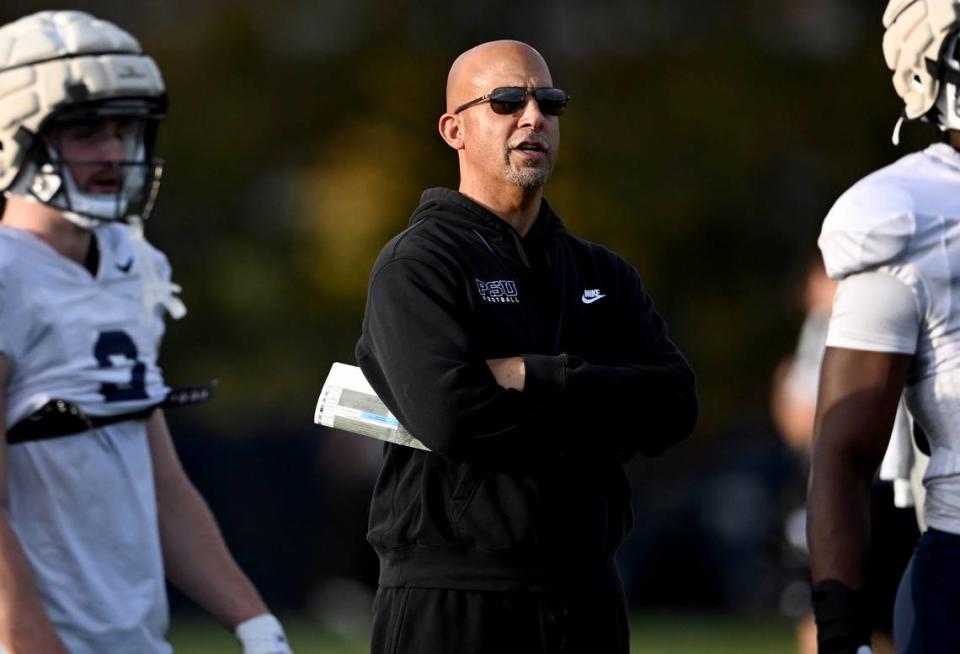Ex-PSU football doc awarded $5.25M in suit that alleged medical interference by James Franklin

A jury found Wednesday in favor of a former Penn State football team doctor who alleged he was removed from the position in retaliation for complaining about coach James Franklin interfering with medical treatment and when injured players should return.
A Dauphin County jury awarded orthopedic surgeon Dr. Scott Lynch $5.25 million. Jurors made their decision after listening to seven days of testimony from doctors, athletic trainers, university officials and former star football players.
Lynch was awarded $250,000 in compensatory damages and $5 million in punitive damages, which are meant to punish and deter future behavior.
In a text message sent Thursday to the Centre Daily Times, Lynch’s attorney wrote he was “satisfied with the verdict, but not the amount of the award.”
“The jury should have added another zero to the award,” Steven Marino wrote. “... Considering what the evidence presented in the courthouse demonstrated an award of that magnitude was fairly warranted.”
Lynch sued his employer, Penn State Health, and Dr. Kevin Black, the supervisor who announced his removal. His supervisors said the university wanted a physician who lived in State College, rather than someone like Lynch who commuted from nearly 100 miles away.
“We are extremely disappointed to learn of the jury’s decision, as we continue to believe that the claims in the complaint have no merit. Penn State Health will soon determine whether it will appeal the decision,” the health system wrote in a statement.
“Penn State Health and the University remain dedicated to the health and well-being of our student-athletes.”
Franklin’s alleged actions were at the heart of the case, but he and the university were dropped from the lawsuit in 2020 over a filing technicality. Known as a hands-on and meticulous coach, Franklin did not testify at the trial.
It’s not known if verdict will result in any action being taken by the university or its athletics department. A message left Thursday with two spokespeople was not immediately returned.
Lynch, according to testimony and court documents reported by PennLive, claimed his ouster followed repeated clashes with Franklin over medical decisions and treatment plans for injured players after he took over in 2014.
The doctor said he was terminated because he refused to “allow a coach to interfere with his medical treatment and return-to-play decisions,” PennLive reported.
Penn State Health’s attorneys argued to the jury that there was no evidence Lynch ever altered his treatment of players under pressure from Franklin or anyone else.
Defense attorney Sarah Bouchard attempted to paint Lynch as someone who had bad communication with Franklin, PennLive reported, in part because he was not on campus every day.
In her closing argument Wednesday, she said her clients did “nothing wrong” in removing a doctor who wasn’t “all-in” because he was never available in State College full time, PennLive reported.
She did not answer questions from a PennLive reporter that sought to understand why she did not have Franklin answer for a litany of examples cited by Lynch, a second team doctor and a former head trainer of his meddling in medical decisions. Black declined comment.
During his testimony, Lynch read from an email he wrote to the university’s former integrity officer in January 2019 that alleged Franklin’s influence on then-athletic director Sandy Barbour led to his removal. He also read from a 2015 email that expressed similar concerns, according to PennLive’s reporting.
Dr. Peter Seidenberg “worked for the university’s College of Medicine for eight years and was the primary care physician who worked alongside Lynch,” ESPN reported. He described “an incident in which an athlete had a high-ankle sprain and wasn’t cleared to play, but Franklin ‘was trying to influence medical decision ... We were being pressured to release the athlete,’ ” according to ESPN.
Former athletic trainer Tim Bream testified Franklin was opposed during a March 2017 discussion about a player who he said needed shoulder surgery.
ESPN’s story quoted Ream as testifying: “He had a strong opinion of what he wanted to have done, and he tried to insert that into making us see his way, which was not in the best interest of the athlete.”
He and Seidenberg also testified about a football player who attempted suicide in October 2017 and was admitted to inpatient psychiatric care. During a meeting, testimony alleged Franklin wanted doctors to medically disqualify the athlete so he could use his scholarship for another player, PennLive and ESPN reported.
Lynch said the player would still receive free tuition from Penn State, according to PennLive.
Former Penn State running back Saquon Barkley and quarterback Trace McSorley said Franklin texted them and requested they testify in support of him. On the stand, PennLive reported Barkley said he never felt pressured by the coach when it came to treatment for injuries.
Former Penn State defensive tackle Rob Windsor, meanwhile, testified he felt pressured to return from a knee injury, ESPN reported.
“The Hershey defendants should feel very fortunate the jury imposed only a $5.25 million dollar award against them,” Marino wrote in a text to the CDT. “It is my hope the verdict and award may bring attention to this very important public issue.”

 Yahoo Sports
Yahoo Sports 
